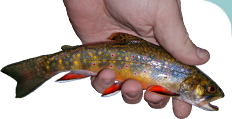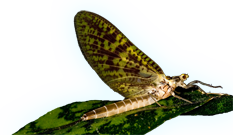Blog & Latest Updates
Fly Fishing Articles
Insects by Common Name


> > northern california caddisfly
| Troutnabout | November 27th, 2006, 9:52 pm | |
| Posts: 20 | can anyone identify this caddisfly and the green leaves used in the home construction? | |
| Troutnabout | November 27th, 2006, 9:59 pm | |
| Posts: 20 | Sorry about my last post. I couldn't figure out how to add a picture attachment. The original photograph is at flyfishing entemology.com. the pictue is titled caddis home. | |
| Taxon | November 27th, 2006, 10:14 pm | |
Site Editor Royse City, TXPosts: 1350 | Sorry about my last post. I couldn't figure out how to add a picture attachment. The original photograph is at flyfishing entemology.com. the pictue is titled caddis home. Troutabout- If you are referring to FlyfishingEntomology.com, I'm not aware of any file titled caddis home on my site. However, I did Google/Images "caddis home" and found the following photo from Michelle Mahood's gallery: http://www.pbase.com/michellemahood/image/24877105 Is that the photo? | |
| Best regards, Roger Rohrbeck www.FlyfishingEntomology.com | ||
| Troutnabout | November 27th, 2006, 10:33 pm | |
| Posts: 20 | roger that's it. sorry about the incomplete info. | |
| Taxon | November 27th, 2006, 10:51 pm | |
Site Editor Royse City, TXPosts: 1350 | Troutabout- No problem. I would guess the photo is of a cased Platycentropus larva. As to which species of leaf was used in construction of the case, that question will need be answered by someone else. | |
| Best regards, Roger Rohrbeck www.FlyfishingEntomology.com | ||
| Troutnabout | November 27th, 2006, 11:00 pm | |
| Posts: 20 | Roger:you are the man! Thanks for your timely responses. I entered a fly swap challege and was given green artificial lei flowers,tan jute and some black yarn to tie with. I just tied two of them and wanted to know what they imitated. Is this a common species? Where in the US are they found besides CA ? | |
| Troutnut | November 27th, 2006, 11:06 pm | |
Administrator Bellevue, WAPosts: 2737 | FYI I just moved this topic to the Platycentropus comments based on Roger's ID guess. :) | |
| Jason Neuswanger, Ph.D. Troutnut and salmonid ecologist | ||
| Taxon | November 27th, 2006, 11:30 pm | |
Site Editor Royse City, TXPosts: 1350 | Roger:you are the man! Troutabout- Well, that stands to be seen. There are others on this site who know much more about caddisflies than do I. As to where they are found, to the best of my knowledge, only in the East and Midwest, where "they are able to thrive in a in a wide variety of habitats, including stillwaters and warmwaters" per Gary LaFontaine. | |
| Best regards, Roger Rohrbeck www.FlyfishingEntomology.com | ||
| Litobrancha | December 5th, 2006, 9:28 am | |
| Knoxville TN Posts: 51 | Schmid lists Platycentropus radiatus from Nova Scotia to Manitoba, my records also include AL GA NC SC TN VA northward. don't have records on P. amicus or P. indistinctus but Schmid lists amicus from Quebec to Alberta and indistinctus from Newfoundland to Ontario. all three are as others have said are distributed in the eastern half of the continent so I'll chime and say I bet that ain't Platycentropus from CA. but the prosternal horn character is the one to look for. | |
| Entoman | October 16th, 2012, 4:01 pm | |
| Northern CA & ID Posts: 2604 | Ah! Luckily the link to the photo is still good. This looks like a turret-cased species of Lepidostoma to me. | |
| "It's not that I find fishing so important, it's just that I find all other endeavors of Man equally unimportant... And not nearly as much fun!" Robert Traver, Anatomy of a Fisherman | ||
| Creno | October 17th, 2012, 11:33 am | |
| Grants Pass, OR Posts: 305 | I suspect this is an early instar of Limnephilus. I will go out on a limb and say less than 2cm long, perhaps about 1cm. The "large" round "leaves" appear to me to be one of the duckweeds and the threads appear to be filamentous algae. The dark anterior band of the prothorax, which is very distinct in the photo, is characteristic of a couple of the pond Limnephilus species. One of those is the common, widespread Limnephilus externus. I have seen early instar Limnephilus externus with cases just like this in Colorado ponds/reservoirs. Often, because the duckweeds are designed to float, the small case is just floating around in the surface film with the larvae flailing its legs around trying to grab onto something. I wonder if the advantage of such case material choice is dispersal or perhaps they just eat house and home. In any case L. externus does it alot and I suspect others in that group do as well. There is another picture on Michelle's page with the larvae extended further from the case. That is a very immature larvae, likely 2nd instar, and sclerite coloration does not appear to have fully developed it. Perhaps recently molted? | |
| Entoman | October 18th, 2012, 1:48 pm | |
| Northern CA & ID Posts: 2604 | Dave -I will go out on a limb... Well, hopefully it's not as flimsy as the one I fell off of.:) I didn't think of an early instar limnephilid, but certainly bow to your expertise. Interesting comments on the drift behavior. I've noticed the same thing, and not just with caddis. Reflects the precarious nature of living a neutral buoyancy life in the weeds, I guess. Wind action - currents caused by turnover - release of their perches to escape predation (or knocked off them by competitors)? I'm thinking these can all be causes as well? | |
| "It's not that I find fishing so important, it's just that I find all other endeavors of Man equally unimportant... And not nearly as much fun!" Robert Traver, Anatomy of a Fisherman | ||
Quick Reply
You have to be logged in to post on the forum. It's this easy:
Related Discussions
| Title | Replies | Last Reply |
| Re: Northern California caddisfly In the Identify This! Board by Troutnabout | 3 | Dec 6, 2006 by DMM |
| Onocosmoecus larvae and cases (3 more) In the Photography Board by Millcreek | 0 | |
| Re: Is it a Grannom? In the Identify This! Board by Simon | 1 | Aug 29, 2021 by Millcreek |
| Identification: not Limnephilus In Limnephilidae Caddisfly Larva by Litobrancha | 0 | |
| Identification: Limnephilidae In Limnephilidae Caddisfly Larva by Litobrancha | 0 | |
| Re: Perhaps Platycentropus In Lepidostoma Little Brown Sedge Larva by Taxon | 1 | May 18, 2007 by Troutnut |
| Re: Nymphs recently molted In General Discussion by Wiflyfisher | 1 | Oct 9, 2021 by Partsman |
| Re: Neophylax larvae and pupae (9 more) In the Photography Board by Millcreek | 3 | Nov 27, 2014 by Millcreek |
| Re: Helicopsychae? In the Identify This! Board by PaulRoberts | 7 | May 6, 2012 by Entoman |
| Re: No-See-Ums In the Identify This! Board by Wbranch | 12 | Sep 24, 2015 by Taxon |
Troutnut.com is copyright © 2004-2024 Jason
Neuswanger (email Jason). See my FAQ for information about use of my images.
 privacy policy
privacy policy



